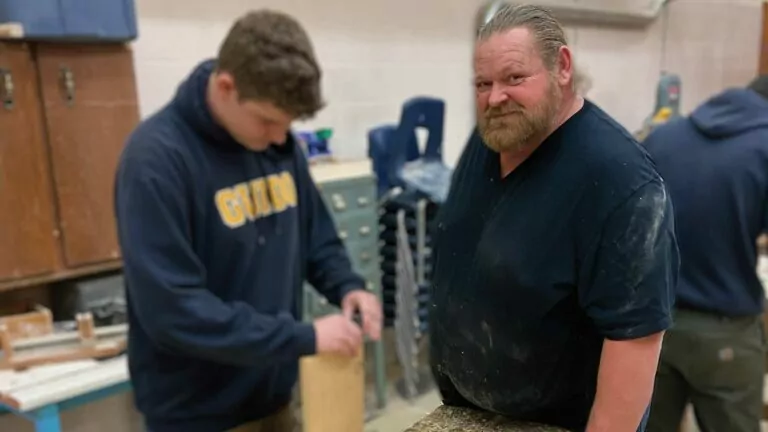There are all sorts of reasons to consider teaching and in this interview, conducted with Mark Penninga (and lightly edited), Paul Bartels offers up his own.
*****
My story starts in 1998. I was working as a carpenter with my own company. I replied to an ad in a bulletin to go on a Faithworks team [mission trip] and ended up going to the Dominican Republic. While I was there, I met a missionary and thought “I could do this job.” He was a former police officer from the Netherlands and he had made the switch. That is what I ended up doing; for four years my family and I moved down to the Dominican Republic and we ended up building Christian schools with Worldwide Christian Schools (now EduDeo).
After four years we knew it was time to come back.
Whose kingdom?
However, I wasn’t exactly happy about being back. I enjoyed what I did in the Dominican. And for nine or ten years afterward I was really angry with God about being here. At the end of that time, my wife asked me to listen to a sermon from Pastor Hilmer Jagersma, on the petition “your kingdom come” from the Lord’s Prayer. The gist of the sermon was “what are we praying for? Are we praying for our own kingdoms or are we praying for God’s kingdom? What is more important in our lives?” I decided for a month I was going to pray, but I wasn’t going to pray for anything in my kingdom. It was all going to be about God’s kingdom.
At that time, I was subbing for a landscaping company and we were building some pretty high-end backyard structures. I had one customer say to me “I don’t really care what it costs, I just want my neighbor to be impressed.” That morning I decided, That’s it, I’m out of this industry. I don’t want to be involved in that. I didn’t think that was good for anyone – I’m building structures that are just to show off. It just played against everything I ever really felt about Christianity.
More important than the material
I quit and over the next year did some interviews. Then a friend of mine, who was actually the board chairman at [Guido de Bres Christian High in Hamilton, Ontario] asked me if I would consider being the high school shop teacher since I was a carpenter. I said “Nah, I’m looking for a missional job.” He said “well, pray about it.”
I went home and talked to my wife and we prayed. A week later I was at a breakfast meeting with one of our pastors and he was standing in line waiting for his food, talking to someone else, and he was saying that if he hadn’t become a pastor, he would be a high school teacher since it was so missional. It’s funny how God works in those situations. I immediately clued in, so I applied, got the job and that’s the reality of it.
I think what I was searching for in life was something that had permanent value. I can’t think of anything more permanent than salvation and eternal life and being a catalyst to bring that into people’s life.
When I went in for the interview [spring of 2019] they asked me why I wanted to this. I said “to be honest, I don’t really care about teaching woodworking to kids. That is not my goal. My goal is to teach them about God.” They said “perfect,” so that’s how I got hired.
One of the issues that I feel is affecting the draw of teachers – more so for males than females – is “whose kingdom are you working for?” I think that if people would take real stock of what they are working for, they might find that material goods are high up on their list, whereas God’s kingdom is not. That’s really what I’m hearing, and what I experienced in my life. I was a Christian but never really took the time to take stock or just pray about God’s kingdom. I think that is one of the biggest pulls that can influence people to go into a career as a teacher, (or even a pastors) – asking, what are we doing for God’s kingdom, and, is it permanent?
Great conversations
Hands-on tech students will often have certain characteristics. Some like to be busy, can’t sit in a desk long, and they can’t focus on reading. So, it takes a different style to teach them. By adapting my way of teaching to their style, it gives me a level of creditability. They think “finally, someone who understands us.” That then opens up the possibilities for better discussions. I get to develop a personal relationship with these students.
It has been an awesome opportunity. I have had students who have contacted me with some of their problems and we have taken time to pray about it and try to develop their prayer life as well. However, Covid did put a big stomp on that.
We often talk about the providence of God and how He looks after us. I think a lot of times we forget about His providence when we go to work on Monday. We need to develop a holistic view of our lives. We’re not just people who go to church twice on Sunday and wear the appropriate clothes. We need to be asking, “What are we really doing with our lives for God’s kingdom?” That is what I’m preaching to people struggling with their careers, and not happy with what they are doing. Maybe there is no enjoyment because you are not doing what God wants you to be doing.















